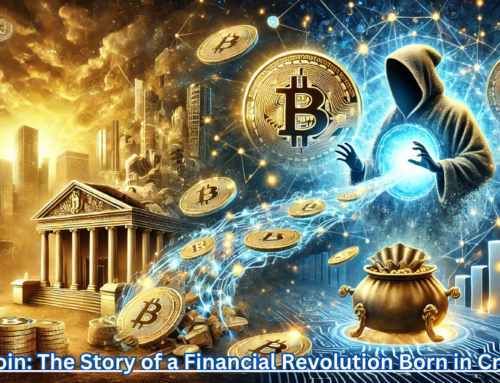A Future Without Banks Controlling Your Money
Banks control how you access your money. They decide when you can withdraw, set fees that eat into your savings, and change interest rates at will. You trust them because you have no choice. But what if that changed?
Imagine owning your wealth outright—free from government intervention, banking restrictions, or economic crises. No one could freeze your account. No corporation could dictate how you spend your money. This idea isn’t some utopian dream. It’s a vision of a post-fiat world powered by Bitcoin, where currency is decentralized, transparent, and immune to manipulation.
The Cracks in the Fiat System
Our global financial system is built on fiat currency—money backed by nothing but government promises. This system has existed for decades, but its weaknesses are becoming harder to ignore. Inflation eats away at purchasing power, and central banks print money at will, driving debt and economic instability.
Some nations have already felt the consequences. In Venezuela, Zimbabwe, and Turkey, hyperinflation has destroyed savings overnight. Families who once lived comfortably found themselves struggling to afford basic goods. Trust in traditional currencies has eroded, forcing people to seek alternatives. For many, that alternative has been Bitcoin.
Bitcoin was born in 2009, in the aftermath of the 2008 financial crisis. That crisis revealed the fragility of centralized finance. Millions lost their jobs, homes, and savings due to reckless decisions made by a handful of institutions. The public suffered while banks were bailed out. In response, Bitcoin emerged as a radical alternative—a peer-to-peer digital currency governed by math, not policymakers.
Unlike fiat money, which can be endlessly printed, Bitcoin has a fixed supply of 21 million coins. Its transactions are verified by a decentralized network, making manipulation nearly impossible. Every Bitcoin transfer is recorded on a public ledger, ensuring transparency. This starkly contrasts traditional banking, where monetary policy decisions happen behind closed doors.
Bitcoin in a Post-Fiat World
Imagine a world where Bitcoin replaces fiat currency. National borders no longer limit economic opportunity. Anyone, anywhere, can send or receive money instantly without intermediaries.
A farmer in Kenya could sell produce to a European buyer without worrying about currency conversions or high remittance fees. A small business in Argentina could accept payments without relying on unstable local banks. People would no longer need financial gatekeepers. They would become their own banks, storing and managing their wealth in digital wallets.
This future is not just theoretical—it has real-world implications. Today, nearly 1.4 billion people lack access to banking services, according to the World Bank. For them, Bitcoin isn’t just an investment—it’s a lifeline. With just a smartphone and an internet connection, they can participate in the global economy, save, invest, and transact without barriers.
Critics argue that Bitcoin is too volatile to serve as a stable currency. Its price swings have made headlines for years, overshadowing its long-term potential. But early-stage technologies often face volatility. Amazon and Apple stocks were once considered unstable. Over time, as adoption increased, they became household names. Bitcoin may follow the same trajectory.
The Battle Between Bitcoin and Government Digital Currencies
Governments and central banks are not ignoring this shift. Many are exploring central bank digital currencies (CBDCs) to modernize their financial systems. At first glance, CBDCs may seem like an improvement—faster transactions, lower costs, and a cashless society. But they come with serious trade-offs.
CBDCs give governments unprecedented control over money. Every transaction would be monitored. Spending habits could be tracked. In extreme cases, authorities could freeze or seize funds at will. Imagine a future where your ability to make purchases depends on compliance with government policies.
Bitcoin offers a different path. It is decentralized, meaning no single entity controls it. Its transactions are secure, pseudonymous, and resistant to censorship. A post-fiat world built on Bitcoin ensures financial autonomy, not increased surveillance.
Transitioning to a Bitcoin-based system will not happen overnight. It will require major advancements in infrastructure, regulatory clarity, and public education. Bitcoin’s network must scale to handle global demand. User-friendly tools must bridge the gap between traditional finance and decentralized systems. Despite these challenges, progress is already underway.
The Future is Coming—Will You Be Ready?
El Salvador has already embraced Bitcoin as legal tender, testing its impact on financial inclusion and economic growth. Major corporations, including Tesla and Strategy (formerly: MicroStrategy), have added Bitcoin to their balance sheets. Institutional investors, once skeptical, now see Bitcoin as a hedge against inflation.
This movement is not slowing down. Every day, more businesses, governments, and individuals recognize Bitcoin’s potential. As trust in traditional finance declines, Bitcoin’s role in the global economy will expand. The question is no longer if a post-fiat world will emerge, but when.
So, why should you care? Because this shift is about more than money. It’s about power. It’s about who controls your financial future—you or the institutions that profit from the current system. In a digital age, financial freedom is the next frontier.
Imagine telling your grandchildren about this moment in history. You could explain how people once depended on banks and governments to store their money—only to witness a revolution. You could share how Bitcoin changed the rules and created new opportunities for billions.
The choice to be part of this transformation is yours. Whether you see Bitcoin as an investment, a technological breakthrough, or a movement, its potential is undeniable. Will you be ready to embrace the future?
Learn more about Bitcoin by reading Bitcoin: The Story of a Financial Revolution Born in Crisis
Follow me on X, Bluesky, or Medium to stay updated on the latest news, education, and great stories!


